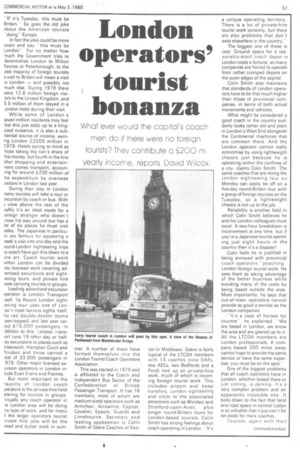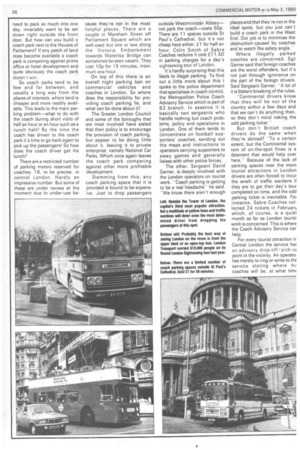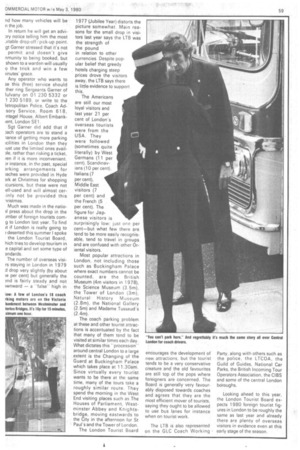London operators' tourist bonanza
Page 59

Page 60

Page 61

If you've noticed an error in this article please click here to report it so we can fix it.
What ever would the capital's coach men do if there were no foreign tourists? They contribute a 200 m yearly income; reports David Wilcox. "IF its Tuesday, this must be Britain." So goes the old joke about the American tourists -doing" Europe.
In fact the joke could be more axact and say "this must be London-. For no matter how -nuch the Government tries to iecentralise London to Milton Keynes or Peterborough, to the /ast majority of foreign tourists a visit to Britain will mean a visit o London — and possibly not -nuch else. During 1978 there mere 12.6 million foreign visiors to the United Kingdom, and 3.5 million of them stayed in a _ondon hotel during their visit.
While some of London's ;even"million residents may feel .hat this just adds up to a king;ized nuisance, it is also a subtantial source of income, earnng London £2000 million in 1979. Hotels spring to mind as hose taking the lion's share of his money, but fourth in the line ifter shopping and entertainnent comes transport, accouning for around £200 million of he expenditure by overseas
risitors in London last year. • During their stay in London nany tourists will take a tour or !xcursion by coach or bus. With view above the rest of the raffic it's an ideal mode for a °reign stranger who doesn't now his way around but has a ist of six places he must visit oday. The Japanese in particuar are famous for squeezing a veek's visit into one day and the ound-London sightseeing trips iy coach have got this down to a ine art. Coach tourist work vithin London can be divided nto licensed work covering adrertised excursions and sighteeing tours, and private hire vork carrying tourists in groups. Leading advertised-excursion iperator is London Transport :self. Its Round London sighteeing tour uses one of Lonon't most famous sights itself, he red double-decker (some pen-topped) and last year cared 615,000 passengers. In ddition to this, London I ranslort runs 19 other day or halfay excursions to places such as ;reenwich, Hampton Court and Vindsor and these carried a Ital of 33,900 passengers in 979. Other major licensed exursion operators in London inlude Evan Evans and Frames. But more important to the lajority of London coach perators is the private-hire field atering for tourists in groups. 'irtually any coach operator in le London area will be doing us type of work, and for many f the larger operators tourist rivate hire jobs will be the read and butter work in sum
mer. A number of these have formed themselves into the London Tourist Coach Operators Association.
This was started in 1976 and is affiliated to the Coach and Independent Bus Sector of the Confederation of British Passenger Transport. It has 16 members, most of whom are medium-sized operators such as Armchair, Arrowline, Capital, Cavalier, Epsom, Guards and Limebourne. Secretary and leading spokesman is Colin Smith of Sabre Coaches of Ken ton in Middlesex. Sabre is fairly typical of the LTCOA members with 14 coaches (nine DAFs, two AECs, two Bedfords and a Ford) tied up on private-hire work, much of which is incoming foreign tourist work. This includes airport and hotel transfers, London sightseeing and vis(ts to the associated attractions such as Windsor and Stratford-upon-Avon, plus longer round-Britain tours for London-based tourists. Colin Smith has strong feelings about coach operating in London. "It's a unique operating territory. There is a lot of private-hire tourist work certainly, but there are also problems that don't exist elsewftere in the country."
The biggest one of these is cost. Ground space for a reasonably-sized coach depot in London costs a fortune, so many companies are forced to operate from rather cramped depots on the outer edges of the capital.
Colin Smith also maintains that standards of London operators have to be that much higher than those of provincial companies, in terms of both actual movements and vehicles.
What might be considered a good coach in the country suddenly looks rather old and plain in London's West End alongside the Continental machines that are common there. And the London operator cannot really economise by using lightweight chassis just because he is operating within the confines of a city, claims Colin Smith. The same coaches that are doing the London sightseeing tour on Monday can easily be off on a five-day round-Britain tour with a group of foreign tourists on the Tuesday, so a lightweight chassis is not up to the job.
Reliability is another field in which Cohn Smith believes he and his London colleagues must excel. A two-hour breakdown is inconvenient at any time, but if you're a Japanese tourist spending just eight hours in the country then it's a disaster!
Colin feels he is justified in being annoyed with provincial coach operators -poachingLondon foreign tourist work. He sees them as taking advantage of the better business while avoiding many of the costs by being based outside the area. More importantly, he says that out-of-town operators cannot provide as good a service as the London companies.
"It's a case of horses for courses", he explained. "We are based in London, we know the area and are geared up to it. All the LTCOA members are London professionals. A company based 200 miles away cannot hope to provide the same service or have the same expertise; you must be on the spot."' One of the biggest problems that all coach operators have in London, whether based there or just visiting, is parking Its a very complex problem and an apparently insoluble one. It boils down to the fact that land and road space in central Loden is so valuable that it just can't be set aside for mere coaches.
Tourists, agaln with their need to pack so much into one day, invariably want to be set down right outside the front door. But how can you build a coach park next to the Houses of Parliament? If any patch of land does become available a coach park is competing against prime office or hotel development and quite obviously the coach park doesn't win.
So coach parks tend to be few and far between, and usually a long way from the places of interests, where land is cheaper and more readily available. This leads to the main parking problem—whet to do with the coach during short visits of half an hour or an hour such as a lunch halt? By the time the coach has driven to the coach park it's time to go back again to pick up the passengers! So how does the coach driver get his lunch?
There are a restricted number of parking meters reserved for coaches; 18, to be precise, in central London. Hardly an impressive number, But some of these are under review at the moment due to under-use be cause they're not in the most helpful places. There are a couple in Marsham Street off Parliament Square which are well-used but one or two along the Victoria Embankment towards Waterloo Bridge can sometimes be seen vacant. They cost 10p for 15 minutes, maximum one hour_ On top of this there is an overall night parking ban on commercial vehicles and coaches in London. So where does the responsibility for providing coach parking lie, and what can be done about it?
The Greater London Council and some of the boroughs that are most involved have stated that their policy is to encourage the provision of coach parking, but appear to be doing little about it, leaving it to private enterprise, namely National Car Parks. Which once again leaves the coach park competing against other more profitable development.
Stemming from this, any coach parking space that it is provided is bound to be expensive. Just to drop passengers outside Westminister Abbey— not park the coach—costs 50p. There are 11 spaces outside St Paul's Cathedral, but it's not cheap here either; £1 for half an hour. Colin Smith of Sabre Coaches reckons it cost £11.50 in parking charges for a day's sightseeing tourof London.
It's hardly surprising that this leads to illegal parking. To find out a little more about this I spoke to the police department that specialises in coach control, the Metropolitan Police Coach Advisory Service which is part of 82 branch. In essence it is basically two sergeants who handle nothing but coach problems, policy and operations in London. One of them tends to concentrate on football supporters' coaches, sending out the maps and instructions to operators carrying supporters to away games and generally liaises with other police forces, The other, Sergeant David Garner, is deeply involved with the London operators on tourist work. "Coach parking is getting to be a real headache" he said. "We know there aren't enough places and that they're not in the ideal spots, but you just can't build a coach park in the West End. Our job is to minimise the obstruction caused by coaches and to watch the safety angle."
Where illegally parked coaches are concerned, Sgt Garner said that foreign coaches are the worst offenders, but it's not just through ignorance on the part of the foreign drivers. Said Sergeant Garner: "A lot of it is blatant breaking of the rules.
'Continental drivers know that they will be out of the country within a few days and that we can't do anything then, so they don't mind risking the odd parking ticket.'" But don't British coach drivers do the same when they're abroad? "To a certain extent, but the Continental system of on-the-spot fines is a deterrent that would help over here." Because of the lack of parking spaces near the main tourist attractions in London drivers are often forced to incur the wrath of traffic wardens if they are to get their day's tour completed on time, and the odd parking ticket is inevitable. For instance, Sabre Coaches collected 24 tickets in February, which, of course, is a quiet month as far as London tourisi work is concerned. This is where the Coach Advisory Service car help.
For every tourist attraction ir Central London the service hat an advisory drop-off /pick-uj point in the vicinity. An operatoi has merely to ring or write to thc service stating where hi; coaches will be, at what tinE rid how many vehicles will be n the job.
In return he will get an advi)ry notice telling him the most Jitable drop-off / pick-up point. gt Garner stressed that it's not permit and doesn't give nmunity to being booked, but shown to a warden will usually o the trick and win a few imutes' grace.
Any operator who wants to se this (free) service should ther ring Sergeants Garner of lulvany on 01 230 5332 or 1 230 5189, or write to the letropolitan Police, Coach Ad-' spry Service, Room 618, ntagel House, Albert Embanklent, London SEl.
Sgt Garner did add that if )ach operators are to stand a )ance of getting more parking icilities in London then they lust use the limited ones avail)le, rather than risking a ticket, /en if it is more inconvenient. )r instance, in the past, special arking arrangements for )aches were provided in Hyde ark at Christmas for shopping ccursions, but these were not ell-used and will almost cerinly not be provided this 1ristmas, Much was made in the natio31 press about the drop in the imber of foreign tourists corng to London last year. To find it if London is really going to deserted this summer I spoke the London Tourist Board, hich tries to develop tourism in e capital and set some type of andards.
The number of overseas visirs staying in London in 1979 d drop very slightly (by about ie per cent) but generally the
and is fairly steady and not iwnward — a "falsehigh in
1977 (Jubilee Year) distorts the picture somewhat. Main reasons for the small drop in visitors last year says the LTB was the strength of the pound in relation to other currencies. Despite popular belief that greedy hotels charging steep prices drove the visitors away, the LTB says there is little evidence to support this.
The Americans are still our most loyal visitors and last year 21 per cent of London's overseas tourists were from the USA. They were followed (sometimes quite literally) by West Germans (11 per cent), Scandinavians (10 per cent), Italians (7 per cent), Middle East visitors (7 per cent) and the French (5 per cent). The figure for Japanese visitors is .surprisingly low; just one per cent—but what few there are tend to be more easily recognisable, tend to travel in groups and are confused with other Oriental visitors.
Most popular attractions in London, not including those such as Buckingham Palace where exact numbers cannot be counted, are the British Museum (4m visitors in 1978), the Science Museum (3.5m), the Tower of London (3m), .Natural History Museum, (2.8m), the National Gallery (2.5m) and Madame Tussaud's (2.4m).
The coach parking problem at these and other tourist attractions is accentuated by the fact that many of them tend to be visited at similar times each day. What dictates this "procession'' around central London to a large extent is the Changing of the Guard at Buckingham Palace which takes place at 11.30aM. Since virtually every tourist wants to be there at the same time, many of the tours take a roughly similar route. They spend the morning in the West End visiting places such as The Houses of Parliament, Westminster Abbey and Knightsbridge, moving eastwards to the City in the afternoon tor St Paul's and the Tower of London.
The London Tourist Board encourages the development of new attractions, but the tourist tends to be a very conservative creature and the old favourites are still top of the pops where foreigners are concerned. The Board is generally very favourably disposed towards coaches and agrees that they are the most efficient mover of tourists, saying they ought to be allowed to use bus lanes for instance when on tourist work.
The LTB is also represented on the GLC Coach Working Party, along with others such as the police, the LTCOA, the Guild of Guides, National Car Parks, the British Incoming Tour Operators Association, the CIBS and some of the central London boroughs.
Looking ahead to this year, the London Tourist Board expects 1980 foreign tourist figures in London to be roughly the same as last year and already there are plenty of overseas visitors in evidence even at this early stage of the season.












































































































